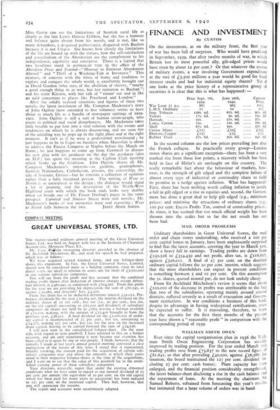FINANCE AND INVESTMENT
By CUSTOS
ON the investment, as on the military front, the first year of war has been full of surprises. Who would have predicted in September, 1939, that after twelve months of war, in which Britain lost its most powerful ally, gilt-edged prices would have risen by about 12 per cent.? Or that whatever the course of military events, a war involving Government expenditure at the rate of £3,500 millions a year would be good for fixed interest stocks and bad for industrial equity shares? Yet if one looks at the price history of a representative group of securities it is clear that this is what has happened:- Price Sept. 7th,
1939. June 26th, 1940. Current Price.
War Loan 31 p.c. 881 96} Ioll L.M.S. Ordinary it to 114 Imp. Tobacco 128s. 9d. 67s. 6c1. 91s. 3d.
Vickers 17s. 6d. 9s. 9d. 13s. 3d Harrods sos. 27s. 6d. 27s.
Lancs. Cotton 12S. I2S. 9d. 16s. 6d.
Shell 87s. 6d. 305. 32S. 6d.
Crown Mines
£151
LI2i £121 Rhokana Copper
£51 £71 Rubber Trust 27s. 6d. 20S. 6d. 24S. 9d.
In the second column are the low prices prevailing just after the French collapse. In practically every group-London stores shares are a significant exception-there has been a very marked rise from those low points, a recovery which has been held in face of Hitler's air onslaught on this country. The really remarkable fact about the behaviour of markets, how- ever, is the strength of gilt edged and the complete failure of almost every type of industrial or commodity share to fulfil its promise as a hedge against inflation. What has happened? First, there has been nothing worth calling inflation to justify a fall in gilt edged or a rise in equities and, second, the Govern- ment has done a great deal to help gilt edged (e.g., minimum prices) and minimise the attractions of ordinary shares (e.g., cio per cent. Excess Profits Tax, control of commodity prices). At times, it has seemed that too much official weight has been thrown into the scales but so far the net result has not been bad.
MAIL ORDER PROBLEMS
Ordinary shareholders in Great Universal Stores, the mail order and chain stores undertaking, who received a ioo per cent. capital bonus in January, have been unpleasantly surprised to find that the latest accounts, covering the year to March 31st, show a heavy fall in earnings. Trading profits are down from £530,528 to £354,430 and net profit, after tax, is £116,807, against £326,011. A final of 21 per cent. on the doubled ordinary capital follows the 20 per cent. interim, which suggests that the most shareholders can expect in present conditions is something between 5 and to per cent. On this assumption the 5s. shares, quoted around par, do not look unduly cheap.
From Sir Archibald Mitchelson's review it seems that about £100,000 of the decrease in profits was attributable to the fact that two of the subsidiaries, operating mainly around coastal districts, suffered severely as a result of evacuation and Govern- ment restrictions. In war conditions a business of this kind, despite its advantage in having widespread ramifications, must be expected to suffer. It is reassuring, therefore, to learn that the accounts for the first three months of the present year have shown a " reasonable profit " in comparison with the corresponding period of 1939.
WELLMAN SMITH OWEN
Ever since the capital reorganisation plan in 1936 the Well- man Smith Owen Engineering Corporation has steadily improved its trading position. For the year ended March 41st trading profits rose from £73,837 to the new record figure of £81,641, so that after providing £4o,00o, against £26,566, for taxation, the board maintained the 121 per cent. dividend 'in- cluding 2} per cent. cash bonus). Plant capacity has 1,een enlarged, and the financial position considerably strengthened, the latest balance-sheet disclosing a rise in the cash balance and the repayment of loans. At the meeting the chairman, Sir Samuel Roberts, refrained from forecasting this year's results, but intimated that a large volume of orders was in hand.


























 Previous page
Previous page